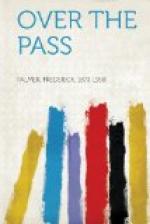“Strong for me! For the store! Yes, Jack!” There was an emphasis on the subjective personal pronoun—for him; for the store!
The father’s face beamed a serene delight. This Jack accepted as the expression of sympathy and understanding which he had craved. It was to him an inspiration of fellowship that set the well of his inner being in overflow and the force of his personality, which the father had felt uncannily before the mother’s picture, became something persuasive in its radiance rather than something held in leash as a threatening and volcanic element. Now he could talk as freely and happily of the desert to his father as to Burleigh and Mathewson. He told of the long rides; of Firio and Wrath of God. He made the tinkle of Jag Ear’s bells heard in the silence of the dining-room as it was heard in the silences of the trail. He mentioned how he was afraid to come back after he was strong.
“Afraid?” queried his father.
“Yes. But I was coming—coming when, at the top of the pass, I saw Little Rivers for the first time.”
He sketched his meeting with Mary Ewold; the story of the town and the story of Jasper Ewold as he knew it, now glancing at his father, now seeming to see nothing except visualization of the pictures of his story. The father, looking at the table-cloth, at times playing with his coffee-spoon, made no comment.
“And that first night I saw that Jasper Ewold had met me somewhere before. But—” he went on after going back to the incident of the villa in his childhood—“that hardly explained. How could he remember the face of a grown man from the face of a boy? Jasper Ewold! Do you recall ever having met him? He must have known my mother. Perhaps he knew you, though why he should not have told me I don’t know.”
“Yes, yes—Jasper Ewold,” said the father. “I knew him in his younger days. His was an old family up in Burbridge, the New England town where I came from. Too much college, too much travel, as I remember, characterized Jasper Ewold. No settled point of view; and I judge from what you say that he must have run through his patrimony. One of the ups and downs of the world, Jack. And he never mentioned that he had met me?”
“No.”
“Probably a part of that desert notion of freemasonry in keeping pasts a secret. But why did you stay on after you had recovered from your wound?” he asked penetratingly, though he was looking again at the bottom of his coffee-cup.
“For a reason that comes to a man but once in his life!” Jack answered.
Had the father looked up—it was a habit of his in listening to any report to lower his eyes, his face a mask—he might have seen Jack’s face in the supremacy of emotion, as it was when he had called up to Mary from the canyon and when he had pleaded with her on the pass. But John Wingfield, Sr. could not mistake the message of a voice vibrating with all the force of a being let free living over the scene. With the shadows settling over his eyes, Jack came to her answer and to the finality of her cry:




